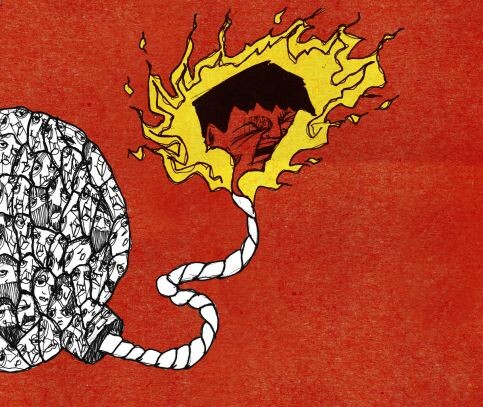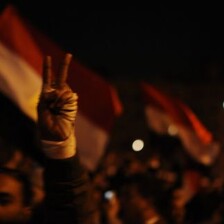The Electronic Intifada 1 February 2011

Illustration: Nidal El-Khairy
The revolution underway in Egypt is being closely watched by Gaza’s youth who see it as a source of empowerment and inspiration. It has stirred our sentiments and has moved us to take to the streets to show our solidarity with our neighbors in Egypt. We attempt to absorb every minute event so as to carry it through the years when we will be able to tell our children how proud we were to have lived through one of the greatest and most inspirational events in the history of the Arab world.
It is common knowledge among Gaza’s educated youth that the older generations who lived through the 1950s are often looked upon as veterans, whose experience and knowledge gives them authority to speak about the current political situation — even when we find their analyses to be very far from accurate.
In fact, many of them are unintelligent and awfully loquacious, speaking only to speak, though their speech might be nonsensical and invalid. Why we listen to them, however, is because we, the younger generation, know they have lived through crucial times in the history of the Arabs and Palestinians, and through many seminal political events: the 1956 Tripartite Aggression on Egypt, the 1967 Israel-Arab war, the 1968 Battle of Karamah, the 1973 October War, the Israeli war on Lebanon in 1982, among many others.
Meanwhile my generation has far exceeded the older one, not only in the diversity and immensity of events we have witnessed but also in the influential role that we as youth have played in bringing about change — the latest of them being the present Egyptian revolution.
Whatever implications Egypt’s revolution might have for Palestinians, it should come as no surprise that the whole population in Gaza is united in support of the revolution and stands in solidarity with the Egyptian people.
Not only do people in Gaza hate Hosni Mubarak as a person and dismiss his despotic ruling system, but they see him as a close ally of their oppressor, Israel. Yet the bonds between the Palestinian and Egyptian people are unbreakable and go much deeper, and the identification of the Palestinians with this revolution is profound and immense.
As if physically taking part in the revolution, Gaza youth like myself feel themselves at the heart of it and follow it as if it were our own. Reflecting on the revolution, one friend told me, “This intifada is the old Arab dream. I watched the unfolding events and felt that the Egyptians’ freedom is my freedom as a Palestinian. I was overwhelmed with happiness. I wish I were in Egypt.”
What must have provoked such a deep feeling of identification with the Egyptian people in my friend was not just awareness of the political causes of the revolution, or thinking about its consequences, but the spiritual connection that oppressed people feel with each other.
This connection formed over the years and reached its peak in the 1950s when thousands of Palestinian refugees settled in Egypt after the Nakba, the expulsion of the Palestinians from their homeland, in 1948. Egypt’s first revolution — in 1952 — was still young. Egypt considered itself to be the guardian of the Palestinian peoples’ struggle until the 1979 Egyptian peace treaty with Israel when the country’s political leadership went in another direction. This might explain why Palestinians reacted sincerely to the Tunisian revolution earlier this month, but the feeling was perhaps not as overwhelming as the case with the revolution in Egypt.
Feeling large-scale changes looming in the region, we send our prayers for the Egyptian people’s well-being and safety and hope they break the shackles of fear and oppression and flourish in their fearless and unprecedented revolution against political corruption, torture, social injustice and grinding poverty. We pray that the Egyptian people will accomplish their dreams and establish their own democratic government. In a region characterized by dictatorial regimes, the Egyptians and Tunisians resuscitated our faith in the power of the people to bring about justice, freedom and equality — a faith that before these momentous events had almost melted away.
Mohammed Rabah Suliman is a student of English literature at Islamic University and blogs at http:/msuliman.wordpress.com.
Related Links





